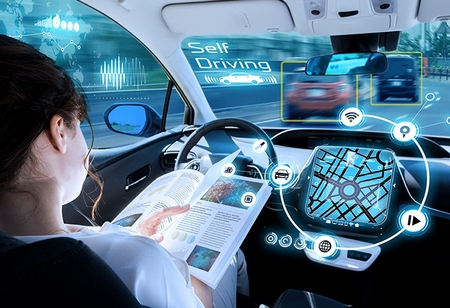From the times of horses and carriages, humans moved to cars and vehicles and slowly we are transitioning to driverless vehicles. As AI is being adopted across many businesses today, the automotive sector has been one of the most revolutionized segments with its integration. According to Global Market Opportunity Analysis and Industry Forecasts by Meticulous Research, the Automotive Artificial Intelligence Market will be worth $15.9 Billion by 2027, growing at a CAGR of 39.8% from 2019-2027.
AI-enabled automotive factories are creating a very positive outlook for the autonomous technology market today. Manufacturers of cars everywhere over the world are today using Artificial Intelligence across every facet of its manufacturing process. Today, we can see robots putting together the initial bolts and nuts of a vehicle or we see today the utilization of Machine Learning (ML) and Vision aiding autonomous vehicles safely drive its way through the traffics.
We are witnessing today a serious competition between various vehicle manufacturing companies to out do its peers in developing self-driving technologies using AI capabilities. It is the same with many tech companies as well, where
everyone is trying to outdo each other by developing news ways to help advance this technology even further.
Hence, AI and machine learning are undoubtedly the future of the automobile industry. Currently, there are many major auto manufacturers, young tech companies and startups that are working on creating their respective autonomous cars and new driving features.
The Automotive Industry is witnessing a disruption due to the integration of Artificial Intelligence by augmenting business growth and streamlining production capabilities. Various designs from vehicle simulations, rapid prototyping, autonomous vehicles,
to improving passenger mobility, auto manufacturers are rapidly upgrading their production systems by utilizing AI capabilities and also focusing on development of autonomous vehicles. While the most valuable aspect of AI in automotive applications is its constantly learning capability, and also adjusting to the rules it uses to navigate the road.
Moreover, every vehicle will learn from each other by transferring information that it learns to the rest of the fleet. Thus resulting in a virtual network of self-driving vehicles which learns on their own as they move forward.
If this technology is segmented into, it can be divided across computer vision, machine learning, context-aware computing, and lastly natural language processing (NLP). Among these, the Machine Learning technology segment shared the largest share of the overall automotive Artificial Intelligence market last year (2019).
This drive is due to the increase in the demand for the signal diagnosing, speech recognition, image recognition, speech recognition, and also the increase in unstructured data generated from the automotive industry. Computer vision has also been one of the AI technologies which has gaining good amount of traction. Reason behind it is its increasing implementation in semi-autonomous vehicles to tackle drowsy/distracted driving and also the growing use of LIDAR sensors and cameras to avoid collisions.
